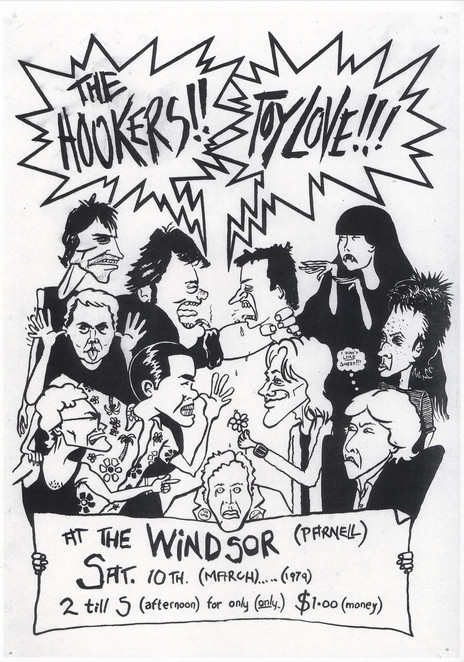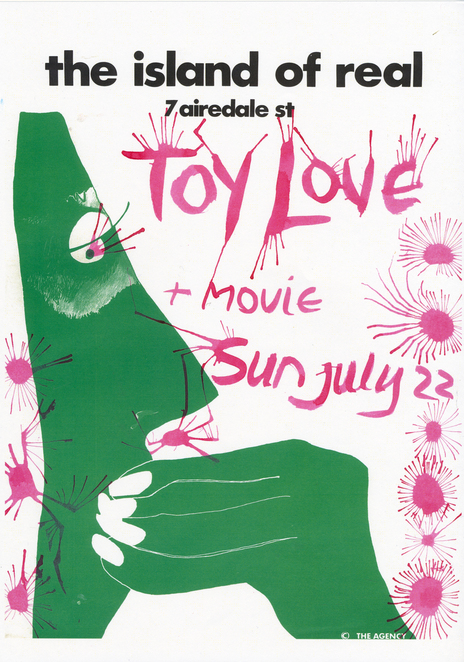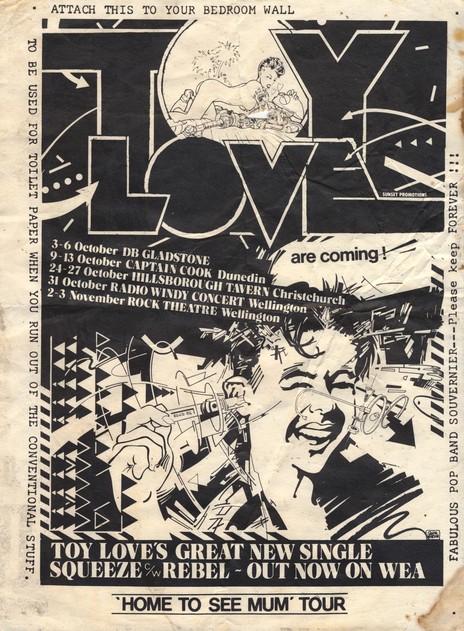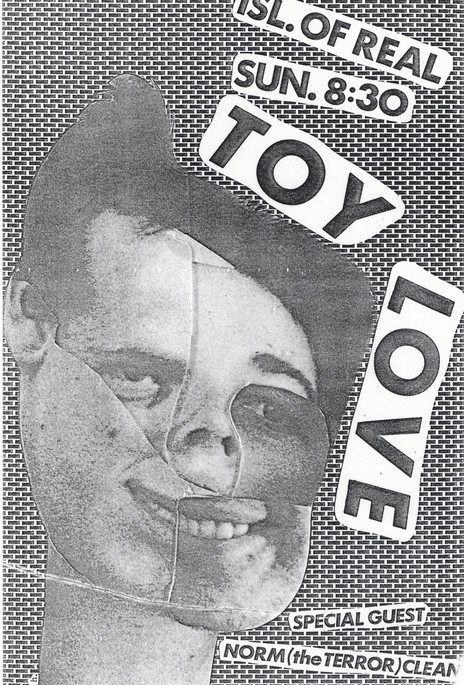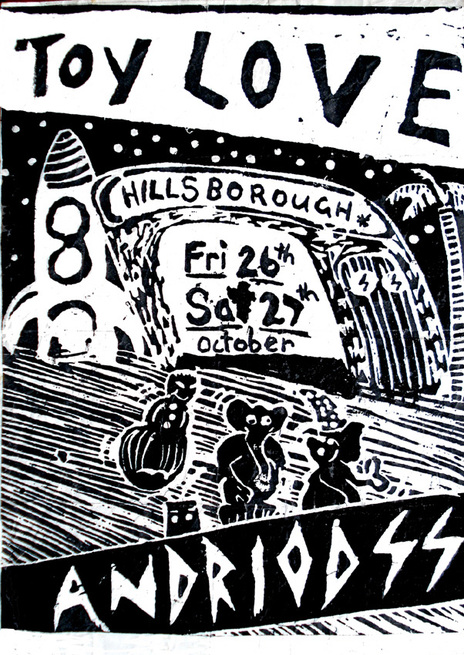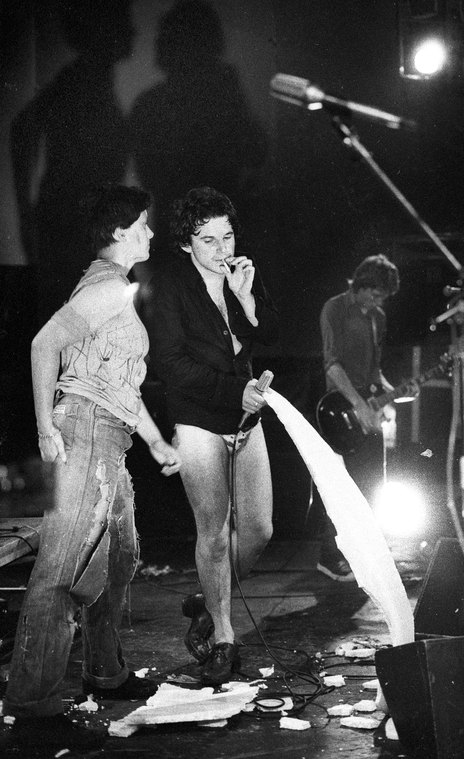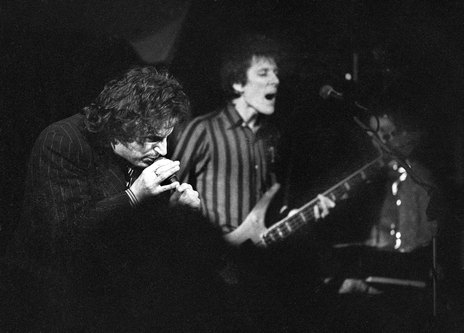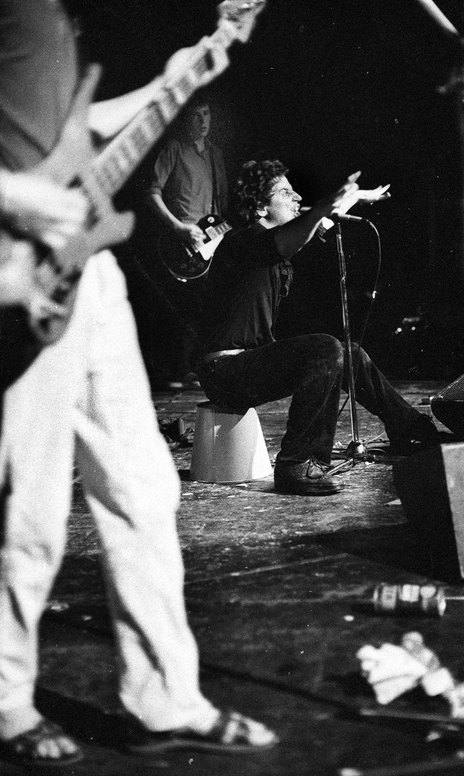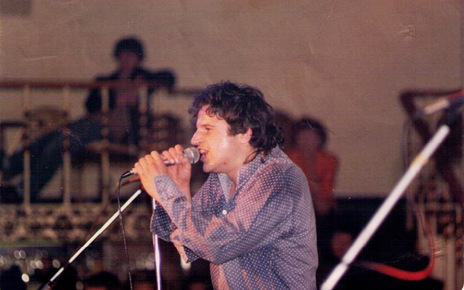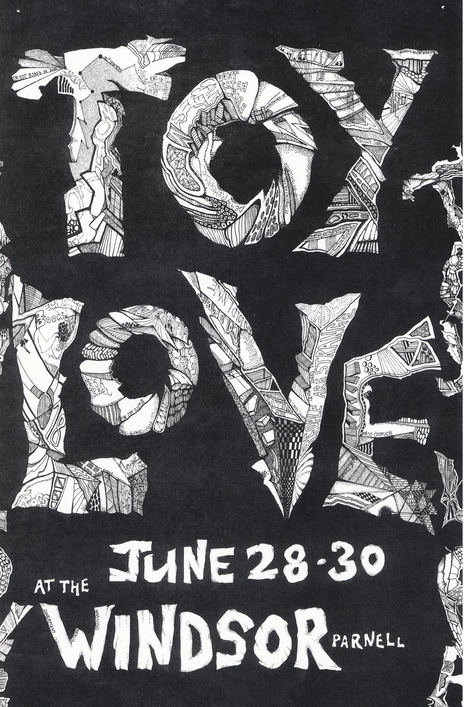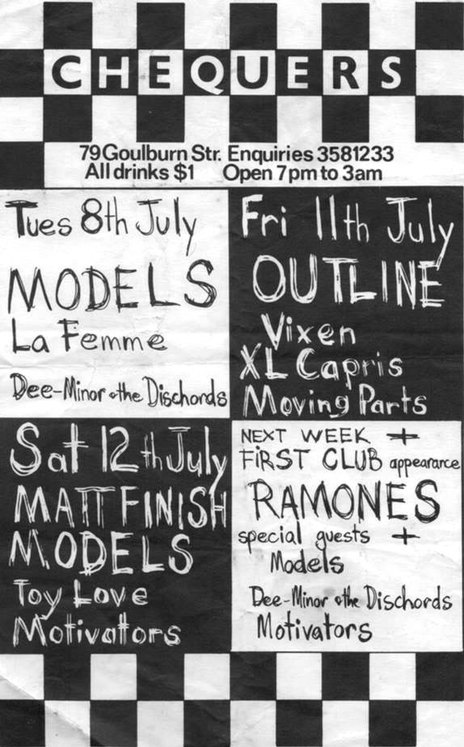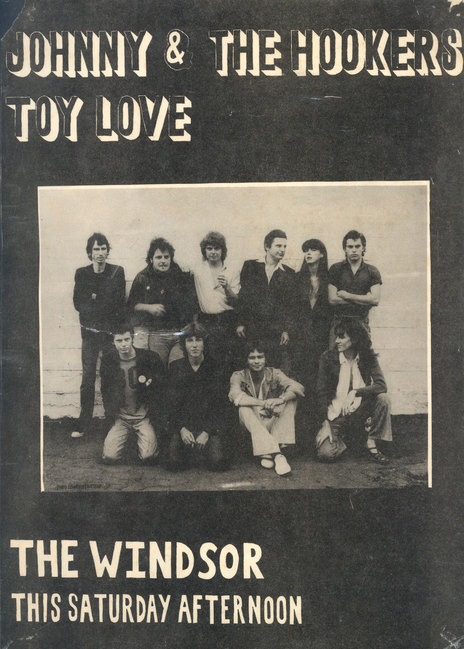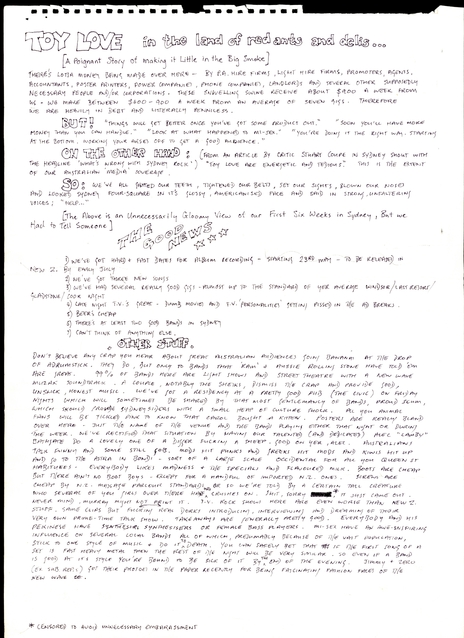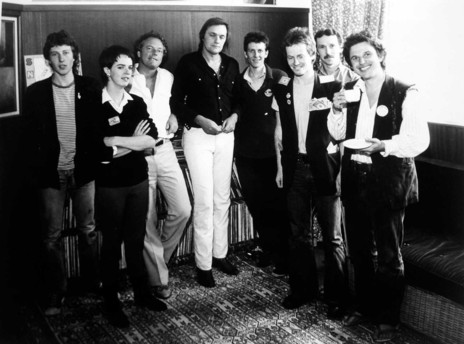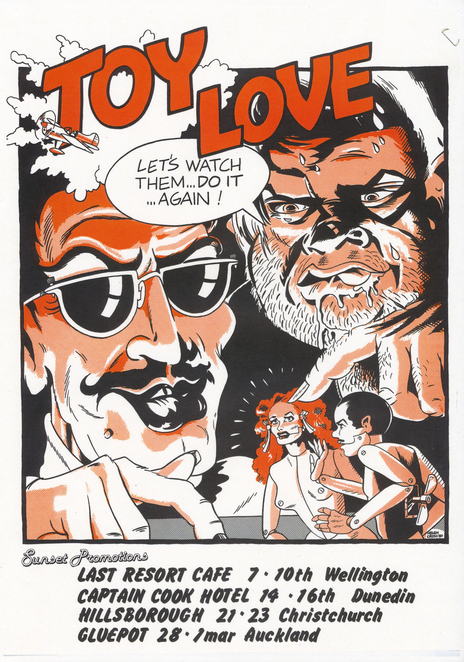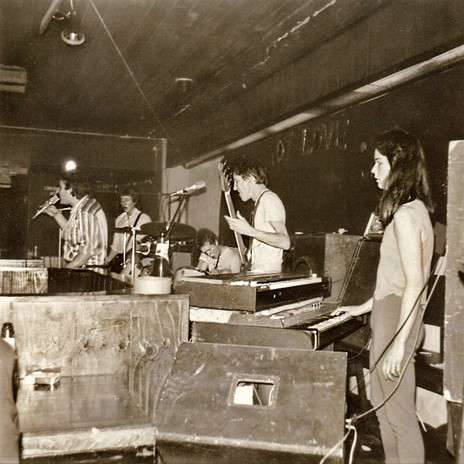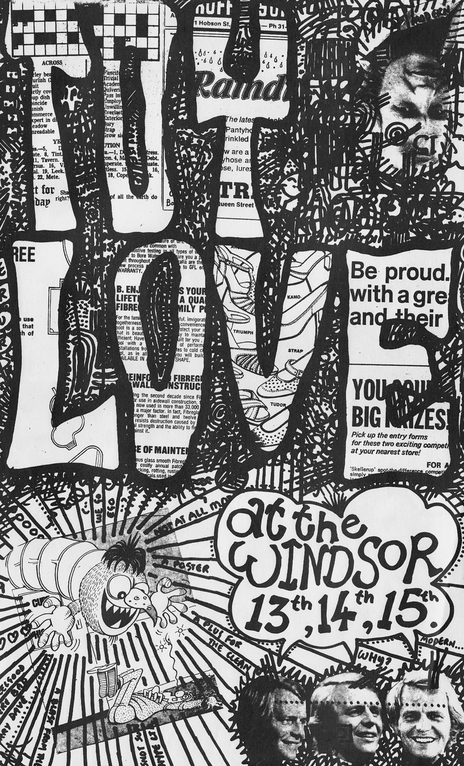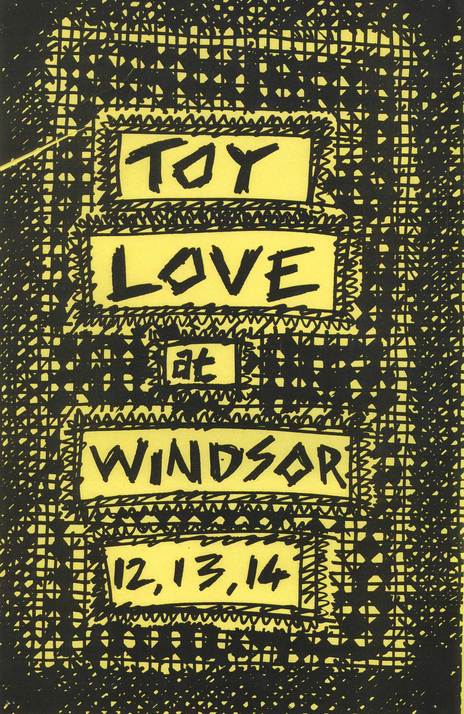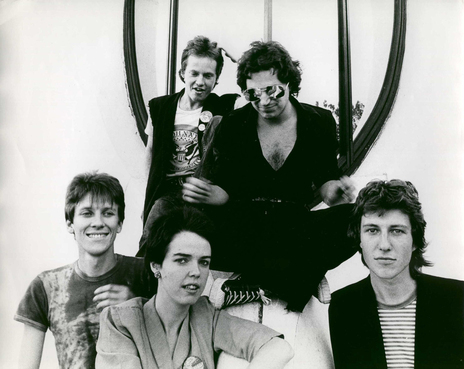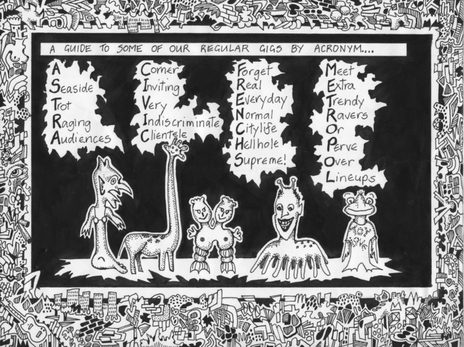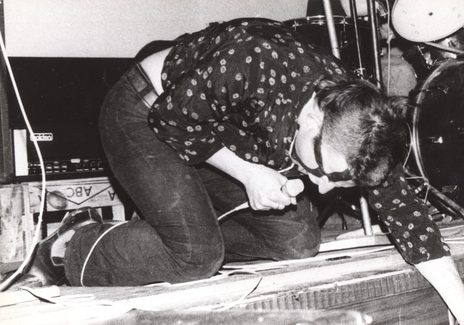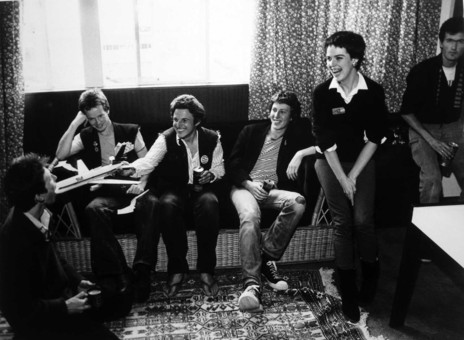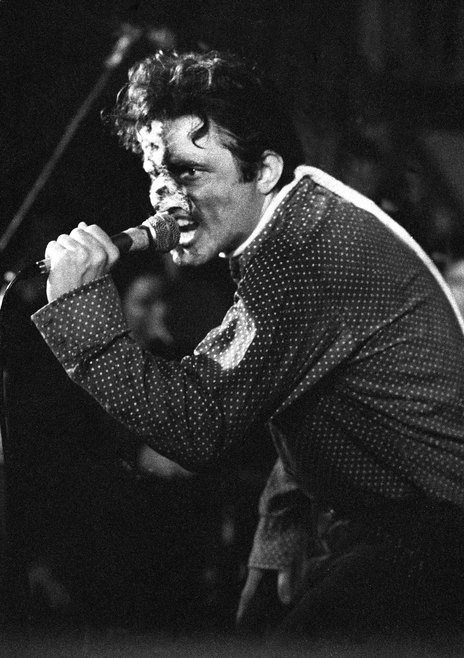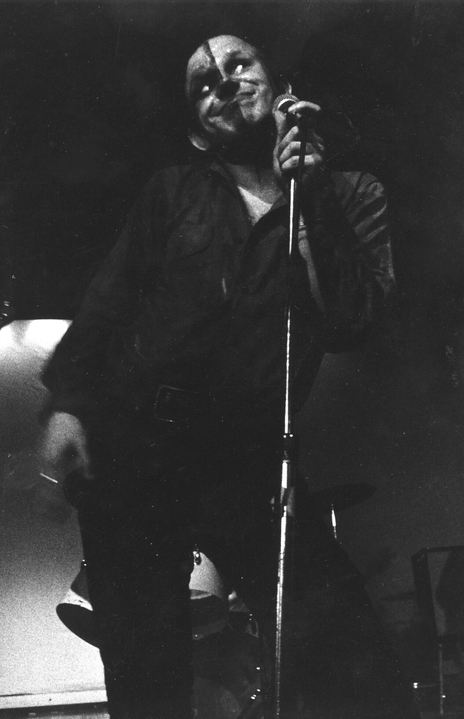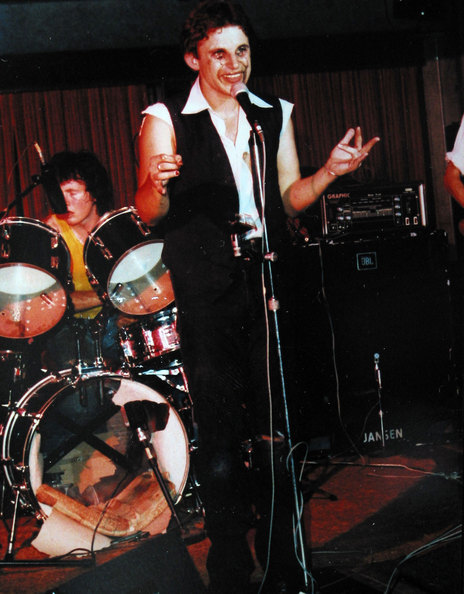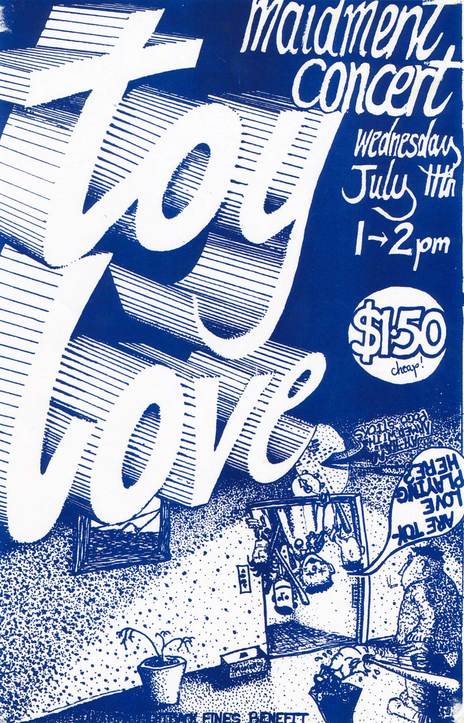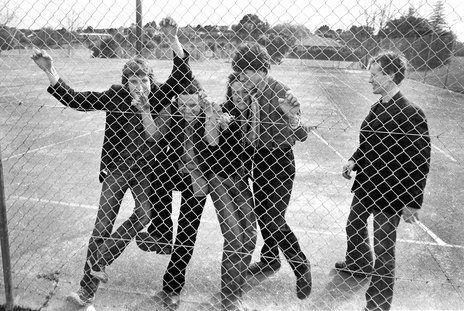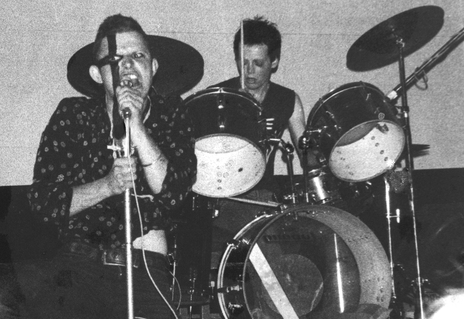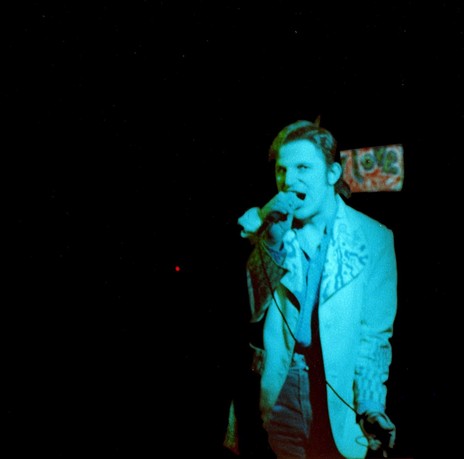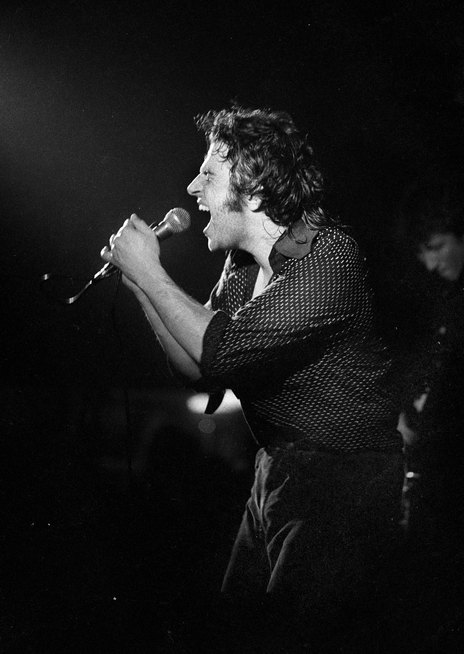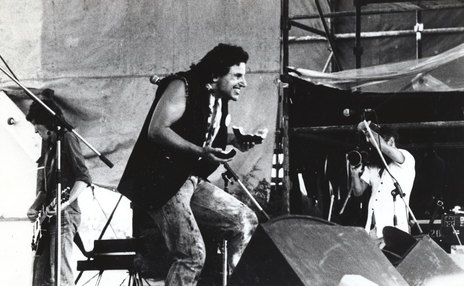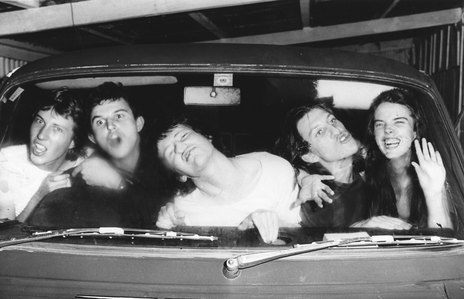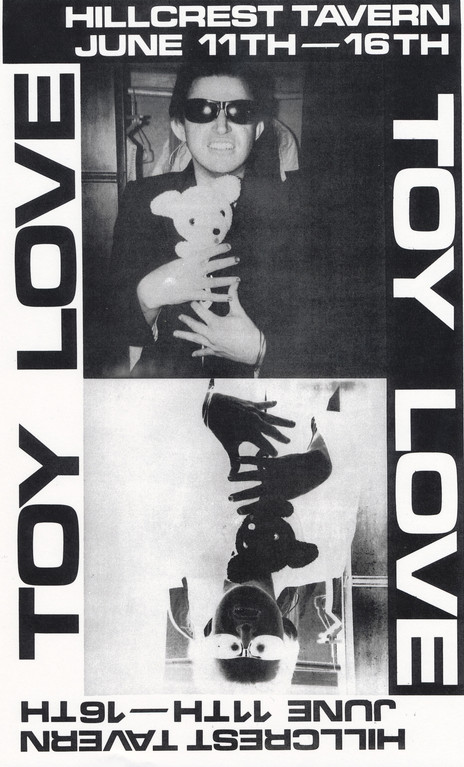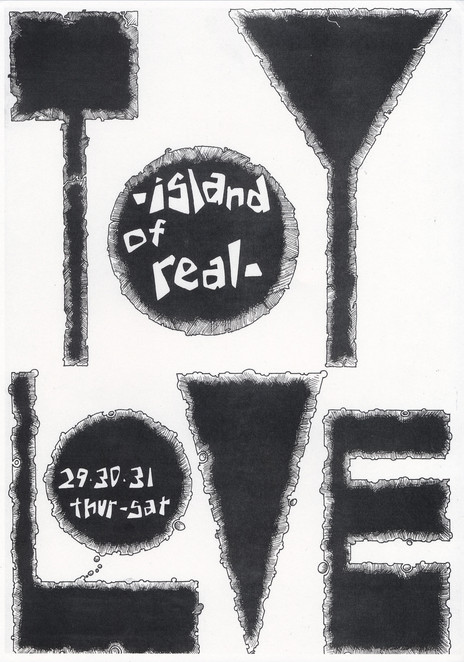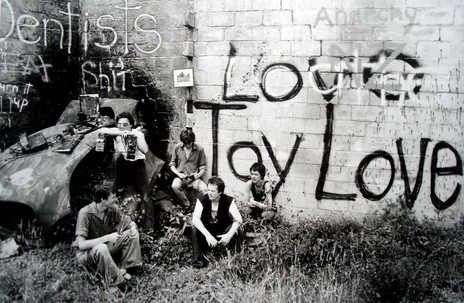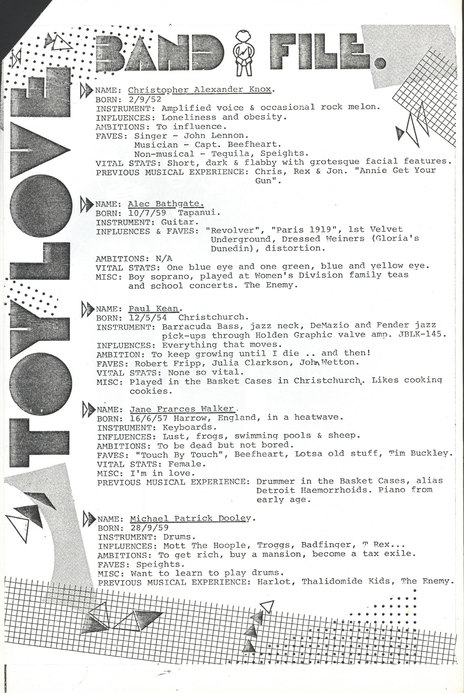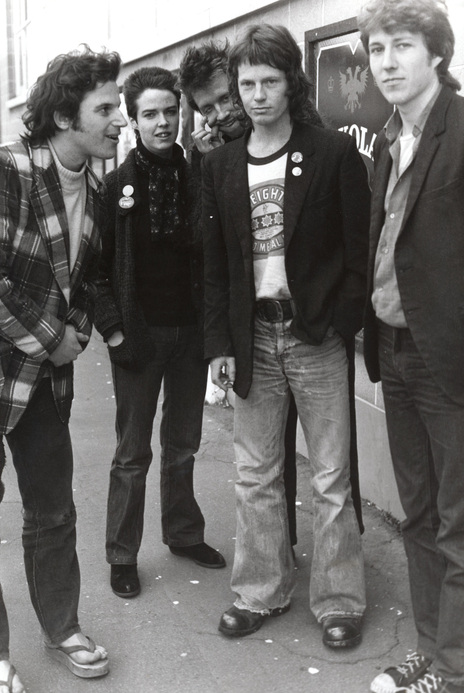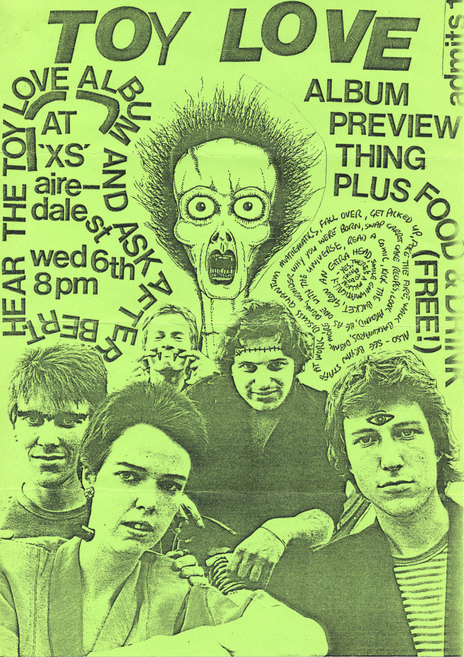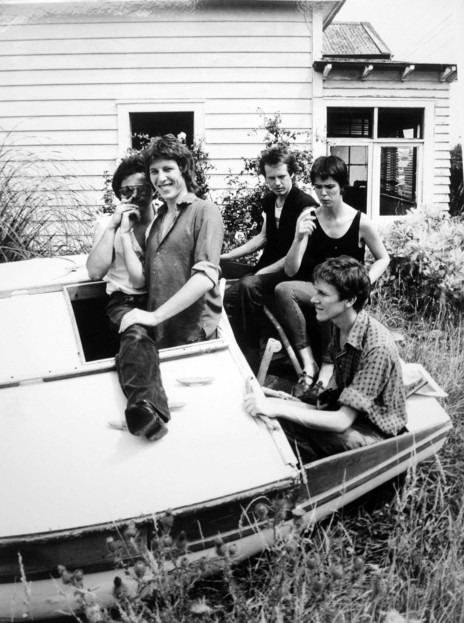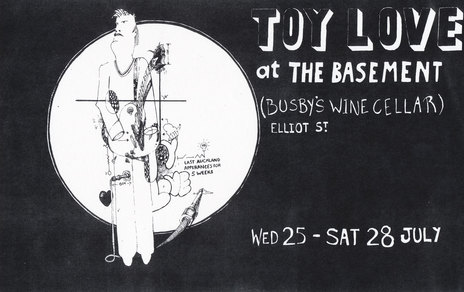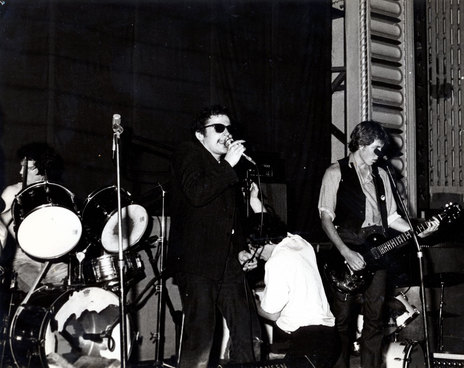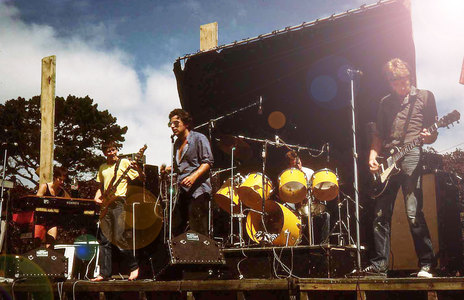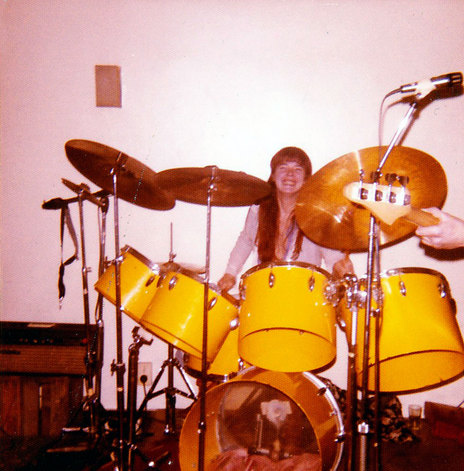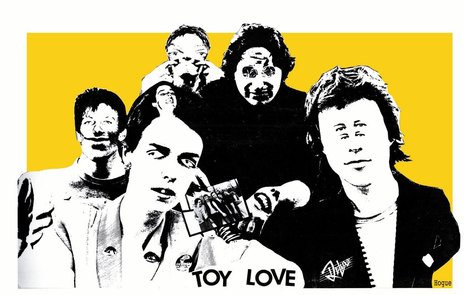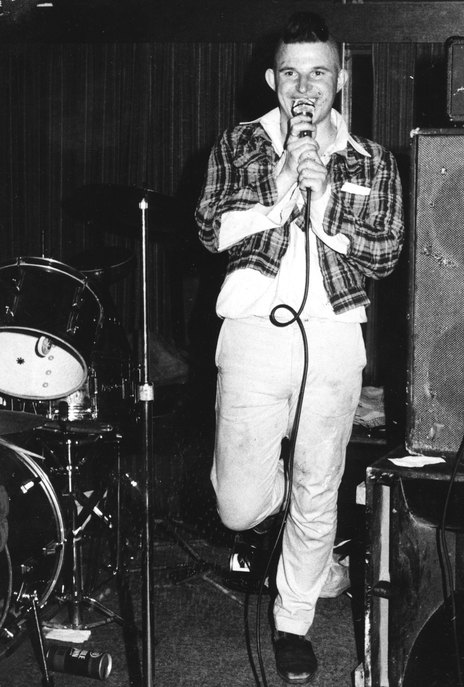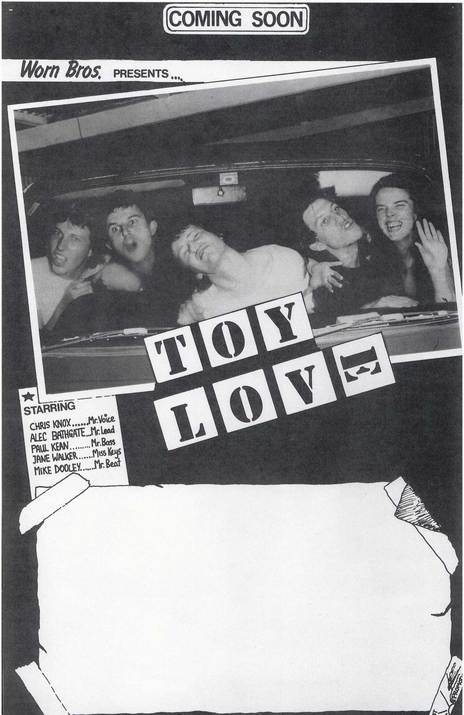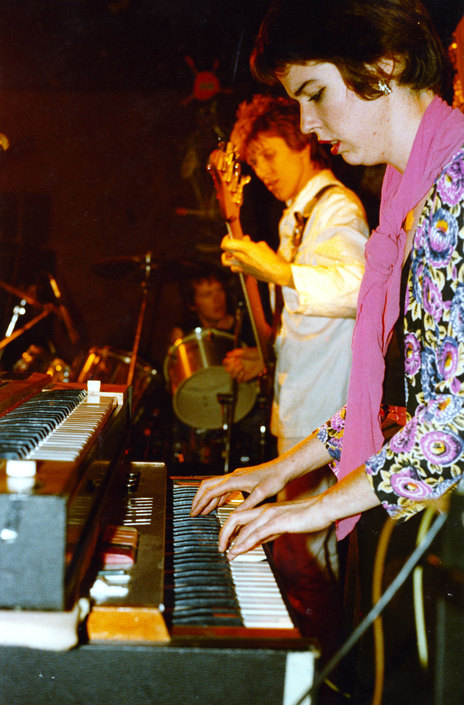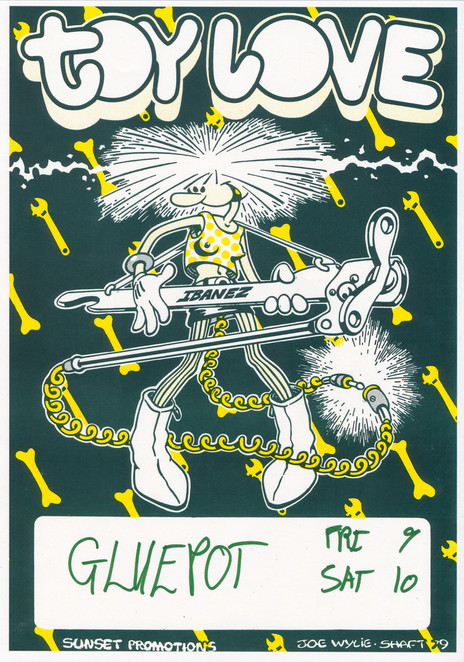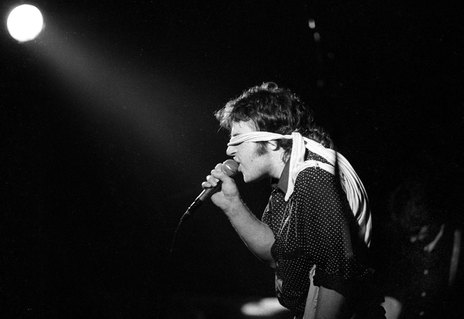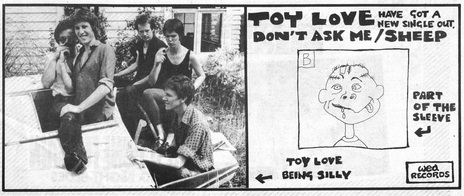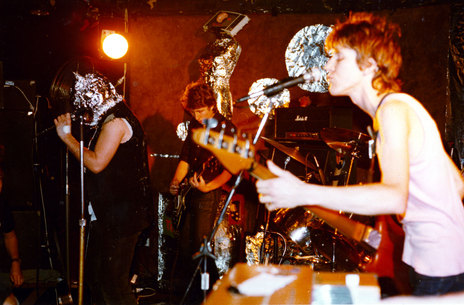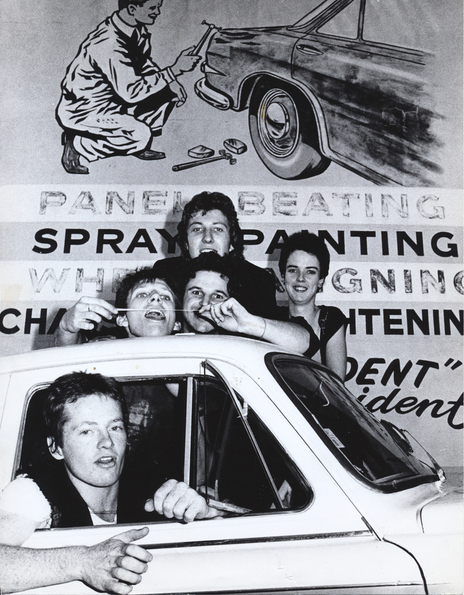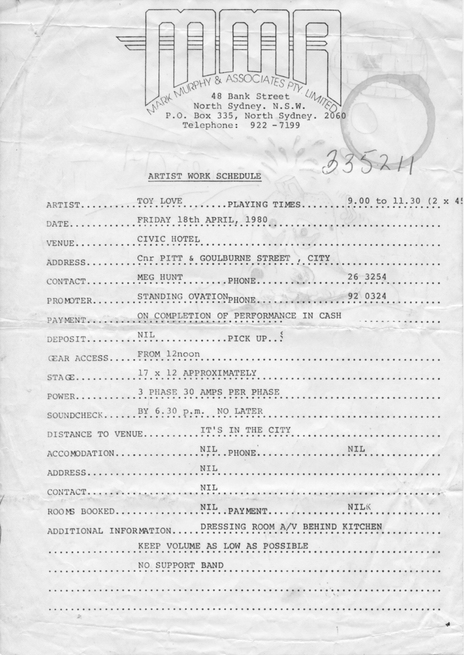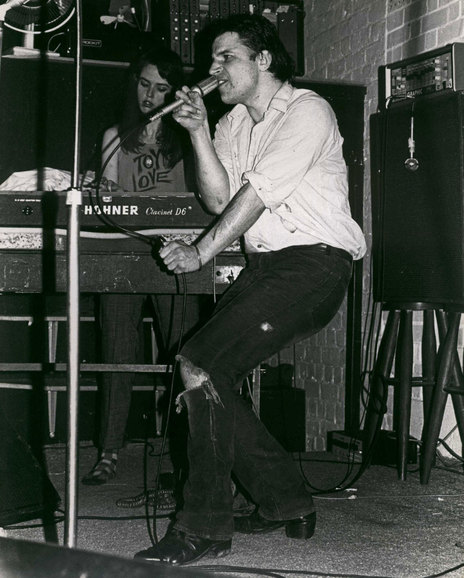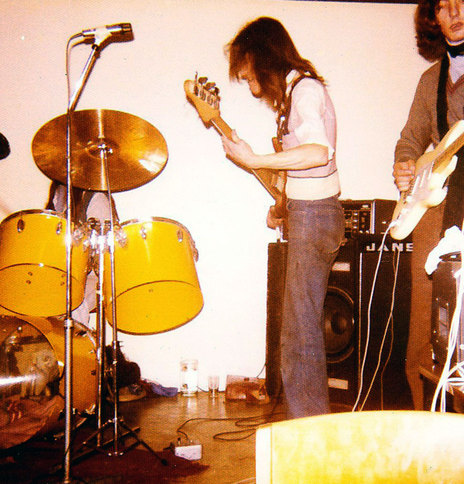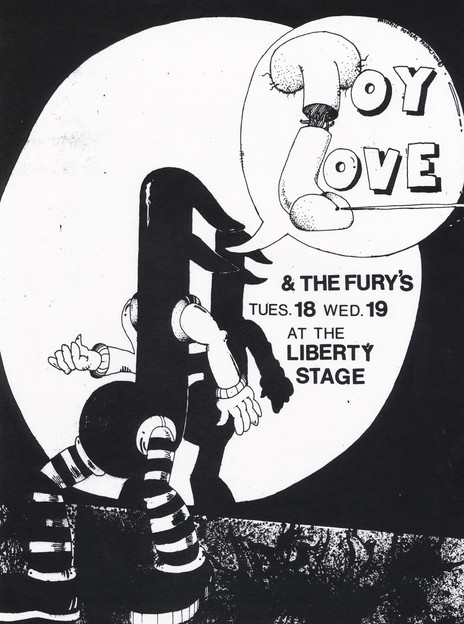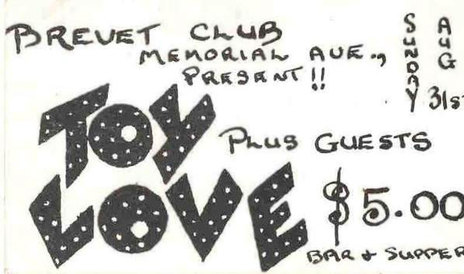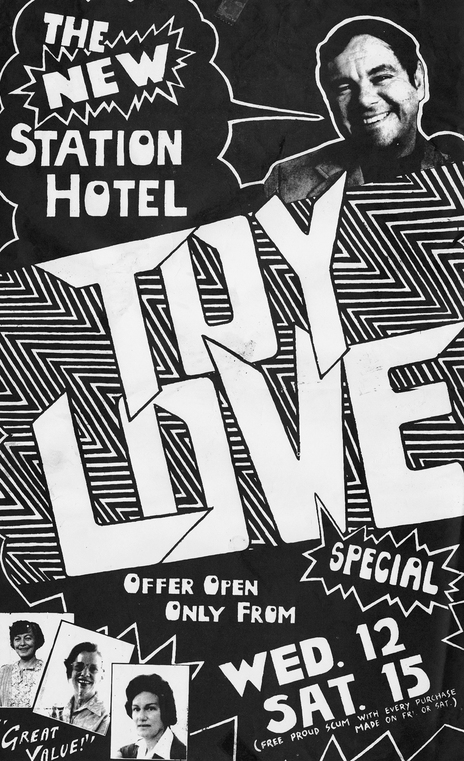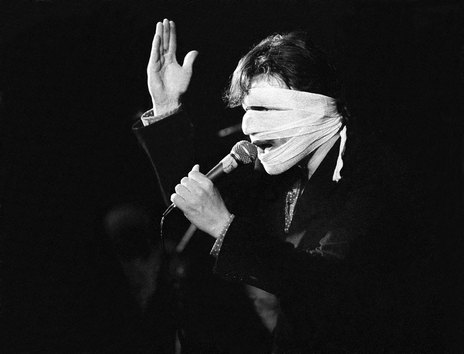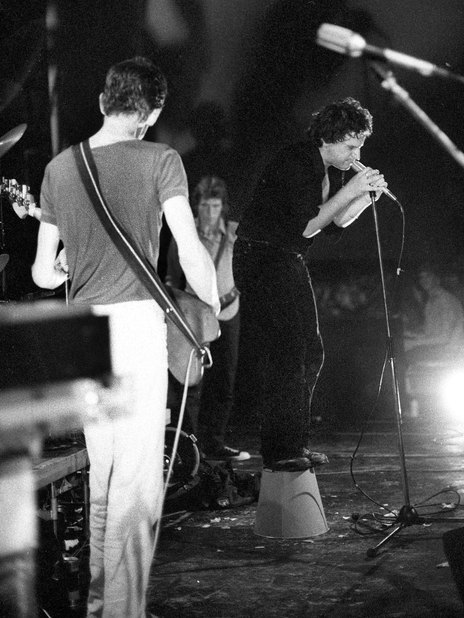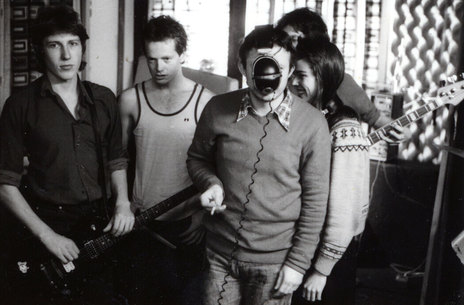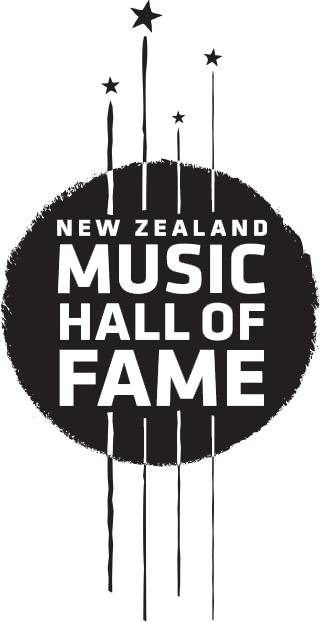Their records all made the pop charts – three hit singles and an album. When the group headed to Sydney, big things were expected, before the next step to England. Despite some limited success across the ditch, Toy Love returned home for a triumphant national tour with an album as high as No.4 in the charts. To the media and the public’s surprise and shock, they flared out and quietly broke up in September 1980.
The rise and fall of Toy Love – 1979 - 1980
It’s a sunny Sunday afternoon in late January 1980 at the three day Sweetwaters Music Festival near Ngaruawahia, and a rising Auckland-based post-punk act, Toy Love, are racheting out splenetic set closer ‘Frogs’, an angry tangle of psychedelic punk already recorded and released on respected American indie, Bomp Records.
The wide, deep stage seems barely able to contain the epileptic fury of singer Chris Knox as he prowls across in black boots and black suit jacket.
The wide, deep stage seems barely able to contain the epileptic fury of singer Chris Knox as he prowls across in black boots and black suit jacket with rudely sheared sleeves, his cap thrust backwards, though soon discarded, chest hair exposed, a bright yellow stain on his jean legs. Behind him – as always – are guitarist “humble” Alec Bathgate (as Knox will label him in song), rolling drummer Mike Dooley, bobbing bassist Paul Kean in pink top and black sandals and eagle-eyed Jane Walker, stabbing away at an Ekosonic keyboard.
As the song ends, Knox demolishes a watermelon onstage, its green skin cracking, exposing red flesh – an echo of the singer’s recent Iggy Pop inspired, self-mutilating past in The Enemy – as a clapping cheering crowd, at least a dozen rows deep, demands an encore. One of whom – Todd Hunter of Dragon, New Zealand’s most successful mid-1970s musical export to Australia – wants to produce the group. Hunter will get his chance.
First recordings
A few days later in Auckland’s Mandrill Studios, Toy Love record with Glyn Tucker Jnr. The former 1960s pop star turned producer’s inspired production and arrangements have already played a big part in the success of Toy Love’s No.29 in the pop charts (in September 1979) new wave pop hit single ‘Rebel’/‘Squeeze’. The similarly addictive ‘Don’t Ask Me’ and ‘Sheep’, another double-sided gem, climbs quickly to No.10 in the pop charts in April 1980. The two singles were combined as an EP for Australian release on Deluxe Records, a new Australian label run by Sydney-based (former AC/DC) manager, Michael Browning.
Following a tip from WEA Record’s Tim Murdoch, Browning, who has seen Toy Love in full flight in Auckland earlier in the month, quickly puts them under contract and makes plans for a move to his base in Sydney, where they can establish a following and record an album. Toy Love see post-punk England as their logical destination so they have a clause written in the contract that will void it if the group’s not there by July 1981. A situation Browning has little problem with. That’s how he broke AC/DC in Australia and Great Britain.
Toy Love never make it to England, and their impact in Australia will be piecemeal, despite appearing on prominent TV shows; a residency at inner city Civic Tavern; regular work including a successful stint in Melbourne; an EP combining their two singles, which gets good radio airplay on influential radio station 2JJ; media coverage in all the main music magazines; and a self titled album recorded in an upmarket Sydney studio with Todd Hunter in June 1980.
Despite what Knox will later say, Toy Love were beginning to build a good live following in Sydney, selling out their final show at Chequers nightclub.
Despite what Knox will later say, Toy Love were beginning to build a good live following in Sydney, selling out their final show at Chequers nightclub before returning to New Zealand in August 1980 for a successful tour to promote their song-crammed, self-titled album, which leaps to No.4 in the pop charts. A tour on which the group will founder and quietly break up.
Paul Kean will go on to become a key member of The Bats, and a concert organiser; Jane Walker will skirt the New Zealand post-punk scene in Wellington then return to England where she was born, as a graphic and, later, internet designer; Mike Dooley will flicker occasionally in groups; Alec Bathgate, responsible for some of Toy Love’s best posters, becomes a graphic designer in Christchurch and eventually, a solo artist; and Chris Knox will help to spark and grow Flying Nun Records, which will release a substantial body of his music, both with Alec Bathgate in Tall Dwarfs and solo. He will also establish himself as a respected artist, filmmaker and commentator, and, for better or worse, a powerful cultural polemicist.
In the years that follow, Toy Love’s myth will be embroidered, and rarely questioned by band, music writers and fans alike. It is Knox, in particular, who will twist the tale to his own needs, reinventing a group with widespread popular appeal as arty outsiders at odds with a punk scene and record industry they were almost fully accepted by, turning Toy Love’s tale into a Gallipoli-like noble defeat and immediate precursor of what was to come.
The grand parade
All of which is still in the future as Toy Love leaves Sweetwaters for a final swing through Auckland and the nation’s venues. It’s barely a year since they emerged from the remains of confrontational, song-rich Dunedin punks The Enemy (Knox, Dooley and Bathgate with bass player Mick Dawson) and Christchurch pre-punks The Basketcases (Kean and Walker). But already they’ve cracked the burgeoning Auckland live scene wide open at punk friendly venues, Zwines, Squeeze, Island of Real, State Theatre, The Windsor Castle, Liberty Stage and Globe Tavern, on bills with the city’s best punk and new wave acts, including The Scavengers, Proud Scum, The Terrorways and The Primmers. Toy Love will soon join them on the era-defining punk and new wave compilation AK79, on new Auckland indie label Ripper Records, contributing two fine, frenetic pop songs – an early version of ‘Squeeze’, and ‘Toy Love Song’.
Toy Love will also partner up with Auckland pub R&B groups such as Johnny and The Hookers, and with the products of rising post-punk scenes in Wellington, Christchurch and home town, Dunedin, on tours that help establish the viability of a wider national pub and club circuit that takes in smaller centres, including New Plymouth, Napier and Hamilton, and of punk-descended group acceptance of it. They are never as alone as Knox paints them. But then that is the nature of the man and his cohort and of the time.
The Enemy
Toy Love were surrounded in New Zealand by a vibrant and rising cultural movement inspired by punk rock and its aftermath, which is increasingly reflected in the diversity of music in record stores and the pop charts, and the live acts stepping out locally. Rather than being at odds with it, they were very much in accord, although that clearly doesn’t pay. The more scorn directed outwards in performance and print, and in Knox’s brilliantly observed acerbic lyrics and the group’s confrontational sound, the more fans Toy Love would gather. They knew this from The Enemy’s experience and the British punk scene that sparked them.
Popular and critical acceptance came quickly to Dunedin’s first punk group. They were embraced by punk communities in Dunedin, Christchurch and Auckland. They had their set filmed by Radio With Pictures in September 1978 in a Dunedin theatre, part of which – ‘Iggy Told Me’ – would appear with some frequency on television. Crowds at Christchurch’s punk friendly venue, Mollet Street, were awed by them.
Their move to Auckland was prompted, not only by frustrated ambition and undeniable talent, but the insistence of Derek King, who organised the early shows that would establish them in the Queen City. King also dangled possible inclusion on a punk compilation, which never eventuated.
Once there, they lived in a house owned by the Idle Idol’s Jamie Jetson. Nor would they be scorned entirely by the street rockers who preceded them. Hello Sailor’s Graham Brazier and Harry Lyon caught an early Enemy show in Dunedin and commented favourably. Dragon’s Todd Hunter we have already met.
The established music industry, too, has favourable things to say about Toy Love. WEA Records releases Toy Love’s first single on the famous Elektra imprint and distributes subsequent records. John McCready, the experienced head of CBS Records in New Zealand, tried hard to sign the group, while also praising AK79 (which CBS distributed) in Rip It Up for its melody and songwriting.
Dunedin
Dunedin’s finest returned often to the city, where they formed in 1977 as The Enemy, and honed their desire and aesthetic. A city where Chris Knox, the creative, adopted only son of an Invercargill stockbroker arrived in 1970 for a brief stint at university followed by a string of casual jobs and caustic sampling of the records and live music the city allows. It’s there where he gathered a gang of fellow travellers around him, and honed his tight, uncompromising worldview, defined as much by what he doesn’t like as what appeals. Even so, it is seven years before he finds an appropriate vehicle for his belief, following a fortuitous meeting with two teenage fans and musicians – guitarist Alec Bathgate from rural Tapanui and drummer Mike Dooley – the musical engine (with Knox mate Mick Dawson) behind his initial performance power and words.
Toy Love attacked and entertained Dunedin audiences on four visits in their short life, almost always at the Captain Cook.
Toy Love attacked and entertained Dunedin audiences on four visits in their short life, almost always at Knox’s old stomping ground, the Captain Cook Tavern near Otago University. Back there in October 1979, journalist and record shop owner Roy Colbert cornered Knox for an epic Rip It Up piece, "Toy Love Week In Dunedin", that praises the group’s performance and new material, and draws the prescient comment (or is it a self-fulfilling prophecy?) from Toy Love’s singer that Australia compromises and blands out New Zealand bands.
They return again in November to the Concert Chamber on a bill with Christchurch mates The Androidss and rising Dunedin punks The Same (with Martin Phillipps), Bored Games (with Shayne Carter) and The Terls – evidence of Toy Love’s supportive role in the emergence of the Dunedin post-punk community. The only band missing is The Clean, who are scattered between Auckland and their hometown, and are yet to regroup.
Sydney, Australia
Whatever doubts they still have, Toy Love with loyal crew, Doug Hood, Chris Moody and Ian Dalziel, WEA Records A&R man Terence Hogan, who’d fostered the group’s rise and signing, and their partners, are in Sydney on March 9, 1980. They have a residency jacked up at the inner city Civic Tavern and a booking agent placing them in venues around the city.
There’s nothing left to prove in New Zealand. ‘Rebel’ and ‘Squeeze’ have been made into videos for Ready To Roll, as has ‘Don’t Ask Me’. They’ve been filmed live for Radio With Pictures at Wellington’s Rock Theatre in early February 1980 and are voted New Zealand’s second best group in RIU’s Readers Poll. They’ve supported two early British tourists, The Members and Squeeze. Sydney, in marked contrast, will defeat them with small crowds (at first), and more galling for Knox, genuine disinterest, which robs him of his scornful power.
Media coverage in Australia will be patchy, although the group attracts interest in all the main Australian music publications, and a short documentary, featuring a live clip of epileptic, punk-pop ‘Sheep’, is made by a New Zealand crew. Money is tight, and it’s an exhausting and ultimately disillusioning time.
Even when the long awaited album, full of classic songs old and new, is finally recorded, Toy Love are not happy.
Even when the long awaited album, full of classic songs old and new, is finally recorded, Toy Love are not happy. Despite sounding fine on play back in the studio, when it is pressed, the sound is muddy, although the group’s positive voice, Paul Kean, will later point to faults in the master cutting disc for pressing vinyl records as the culprit after hearing the superior commercial cassette release, reproduced by a different method. This is borne out in 2005, when the album is remixed by Dale Cotton for Flying Nun Records and re-released as part of the wonderful Cuts double CD.
Members of the group later indicate their positive reception in Melbourne as a hint of what might have been if the group had been based there. And as for England? In the mid-1980s Knox tells Garage fanzine that it would have been too late for them to make an impact there, anyway.
Always leave them wanting more
The album is released in the second week of August 1980. Back in New Zealand in that same month, fans are oblivious to the turmoil, pushing the album to No.4 in the charts. Their best contemporary commentator, Roy Colbert, who will wisely tag them, “The Stooges with Beatles melodies,” gives the collection of “post-punk power, pure pop, macabre melodrama, whoop n’ holler bizarre bop, sublime ice-cold beauty, three chord thunder, chaotic psychedelia,” a qualified thumbs up in RIU, pegging the slower, more dramatic songs as better realised, while noting a good take on three chord punk perennial ‘Pull Down The Shades’, and exciting new material, including ‘Bedroom’.
Their third single ‘Bride of Frankenstein’ makes No.22 in the charts with the only two songs Chris Knox will profess to like on the flipside – ‘Good Old Joe’ and ‘Amputee Song’. The hit side is a celebration of surgery, illusion and hospital bed fears. Like the majority of Toy Love it has enough variety, change of pace, twists of humour and pathos to promote rediscovery with multiple playings. Two videos – one a brilliant world-class cartoon by Joe Wylie – exist of the song. When ‘Amputee Song’ is filmed for a Dunedin current affairs show in a local graveyard, controversy flares, to the group’s delight.
Toy Love’s fans, meanwhile, are flocking in their hundreds to see the group’s national tour. On the way back up the country, the band pause fatally in New Plymouth, where out of the glare, exhaustion and frustrated creativity catch up and the group face their darkest hour. They’d already been difficulties while recording the album, and now, as John Dix recounts in Stranded in Paradise, drummer Dooley wants to play guitar. Faced with change, Knox decides to call it quits.
The blame for the break-up comes to rest on Mike Dooley’s shoulders, and it’ll be years before he gets a chance to have his say. Speaking to Dunedin magazine, Spec, in the 1990s, Toy Love’s drummer says that Australia wrung him out, and that there was no time to develop new songs to drive them forward. He also felt Knox was performing for himself by then. Dooley, one of the era’s most distinctive percussionists had only just turned 20 when the group split.
With band friend Joe Wylie commissioned to produce a cartoon video for ‘Bride Of Frankenstein’, the group, ever loyal to their mates, decide to keep the break-up secret. Their final Auckland shows are a triumph, which fans in 2012 get to revisit via Live At The Gluepot, a double LP Record Store Day release, which rises to No.11 in the New Zealand charts. On it, the group is watertight, their sound punkier and Stoogier than any of the original records, and Jane Walker’s keyboards are higher in the mix.
No-one outside the group and their close friends knows that the end has come, although if you listen closely to a new live song tentatively called ‘Fame’, which appears in early 1982 on the Goats Milk Soap as ‘The Second To Last Song Toy Love Wrote (With Ad-lib Lyrics)', it’s all there in the words, a group, backs to the wall, the end in their face, and the big dream of England dead at their feet, spitting out defiance at a system they’d only half-heartedly embraced to start with, bleeding a slow corrosive blues, cornered, and ready to bolt. The final death rattle.
And that’s where it ends for a good many years.
In November 2012, three years after Chris Knox suffered a near debilitating stroke, Toy Love was awarded The New Zealand Herald Legacy Award at the Vodafone New Zealand Music Awards and a double live vinyl album, Live At The Gluepot, and a vinyl reissue culled from their 2005 compilation, Cuts, scaled the New Zealand album charts.
Jane Walker, the band's ground-breaking keyboardist – and one of its several graphic designers – passed away from cancer on 11 October 2018, aged 61.
